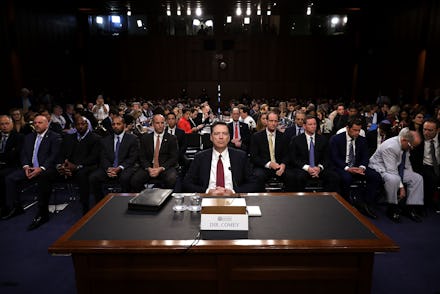Comey wasn't being victim-blamed, but there's a reason so many people thought he was

On Thursday, former FBI Director James Comey endured hours of questions regarding his May firing, Russian involvement in the 2016 election and White House leaks during his hearing before the Senate.
When Comey testified to the interactions he had with President Donald Trump leading up to his firing, some Twitter users felt there was an eerie similarity between Trump's behavior and that of a sexual predator.
According to Comey, when Trump asked him to dinner in January, the president said he'd thought of inviting Comey's entire family, but decided to only invite Comey. During the questioning of this particular encounter, Comey claims he assumed there would be other people attending the dinner.
There weren't — when Comey arrived, he allegedly found himself alone with Trump. Comey said the "set up" made him "uneasy," particularly when Trump allegedly demanded "loyalty" from him.
"Don't ever leave me alone with him again," Comey allegedly told Attorney General Jeff Sessions following the dinner.
To Twitter, the whole thing reeked of the textbook tropes of sexual abuse.
Twitter users found senators' line of questioning into the Comey-Trump dinner equally worrisome, hearing the familiar trappings of victim blaming.
"Do you have an impression that if you had found — if you had behaved differently in that dinner ... do you think you would have still been fired?" Sen. Martin Heinrich (D-N.M.) asked, according to Politico's transcript. Later, Sen. Roy Blunt (R-Mo.) wondered why Comey later took phone calls from Trump, despite allegedly telling Sessions he didn't want to be in the same room alone with the president.
Sen. Angus King (I-Maine) piled onto this line of questioning, asking Comey if he in any way initiated that dinner — and it sent up red flags all over Twitter.
Lisa Corrigan, a University of Arkansas gender studies professor specializing in feminist rhetoric, said it's not surprising viewers of Comey's Senate hearing would draw these comparisons. In a phone interview on Thursday, she said what people across the country are picking up on is a troubling, inherent facet of Trump's masculinity.
She found the allegations that Trump told Comey he "expects loyalty" and he "hoped" Comey would stay on as FBI director particularly revelatory, calling this kind of language indicative of bullying and gaslighting.
"Trump is a documented abuser of women by his own admission," Corrigan said, referring to Trump's infamous hot mic comments.
"I think if anything, his rhetoric points to parts of his personality that didn't get fair consideration during the election because of the way sexism operates in the political sphere," she continued.
"This helps to remind America of the continuity of his abuse of power."
Based on Comey's testimony, Corrigan said it sounds like Trump forced Comey to occupy a "feminine positionality" so he could assert his dominance, as is Trump's wont. Corrigan said we've seen this habit before in the way Trump shakes hands with other male world leaders, and the way he snubbed German Chancellor Angela Merkel.
Corrigan clarified that Comey is not the same as a sexual assault victim — but, by virtue of Trump's male dominance, Comey was inarguably the "feminized one" in his one-on-one interaction with the president. This might have something to do with why his testimony came off sounding much like one of Trump's actual alleged assault victims.
Corrigan insists the tone and rhetoric of Comey's testimony was entirely deliberate.
"Comey is intentionally using language that reflects upon the dangerousness of Trump," she said. "People aren't just projecting this onto him. He was intentionally trying to access this sexual panic that emerged after the Billy Bush tape."
Whether or not the former FBI director — who is, without a doubt, a skilled speaker and interrogator — knew the effect he would have on viewers of his hearing, according to Twitter, it worked. However, it might not have been as successful, Corrigan said, without this sexualized rhetoric having been a part of American politics for centuries.
"If you look at discourse about the Civil War, it's all about the North 'penetrating' the South," Corrigan said. "All of that is rape language."
Some people expressed concern that likening Comey's hearing to a sexual assault trial does a disservice to actual victims of sexual violence.
"Can we not compare the Comey grilling to that of a rape victim?" Vox writer Caroline Framke wrote on Twitter on Thursday. "Even if sometimes rhetorically similar, they're not the same fucking thing."
Corrigan, though, suggested the comparisons could do more good than harm: If viewers can recognize potentially coercive language and abusive behavior in Comey's interactions with Trump, perhaps they'll recognize it the next time a sexual assault survivor comes forward with her story.
"People are drawing attention to the linguistic turns of phrase that point to abuses of power," Corrigan said. "I don’t think it’s problematic or dangerous because it helps us focus on what kinds of language men like Trump use.
"I think that teaches us how to read dangerous masculine behaviors."